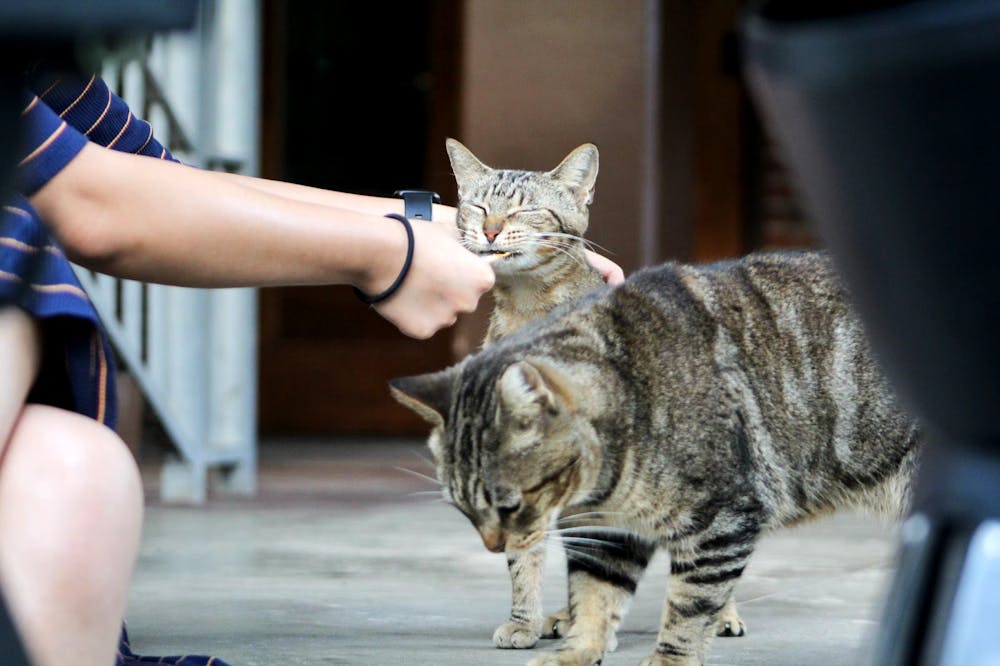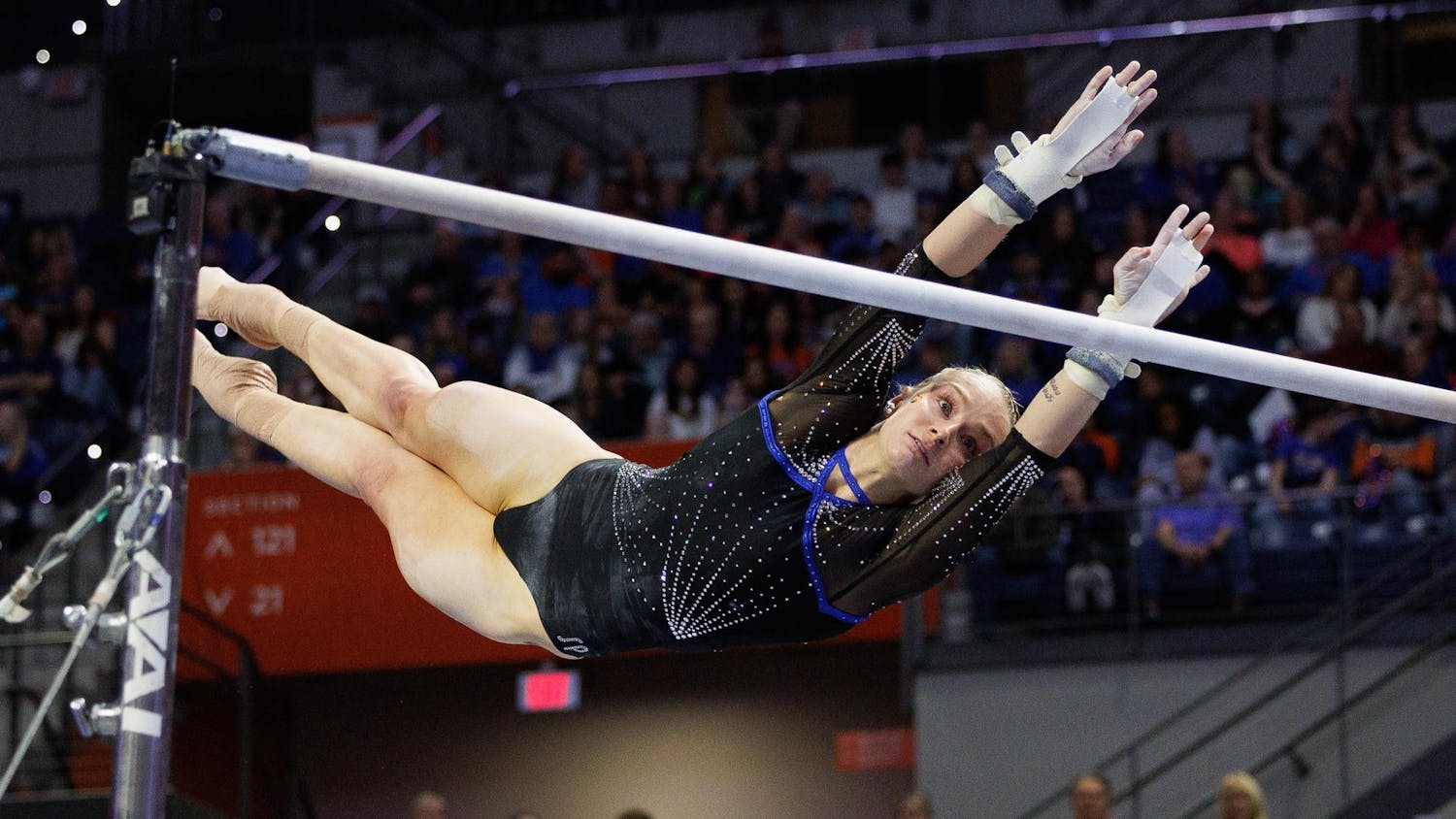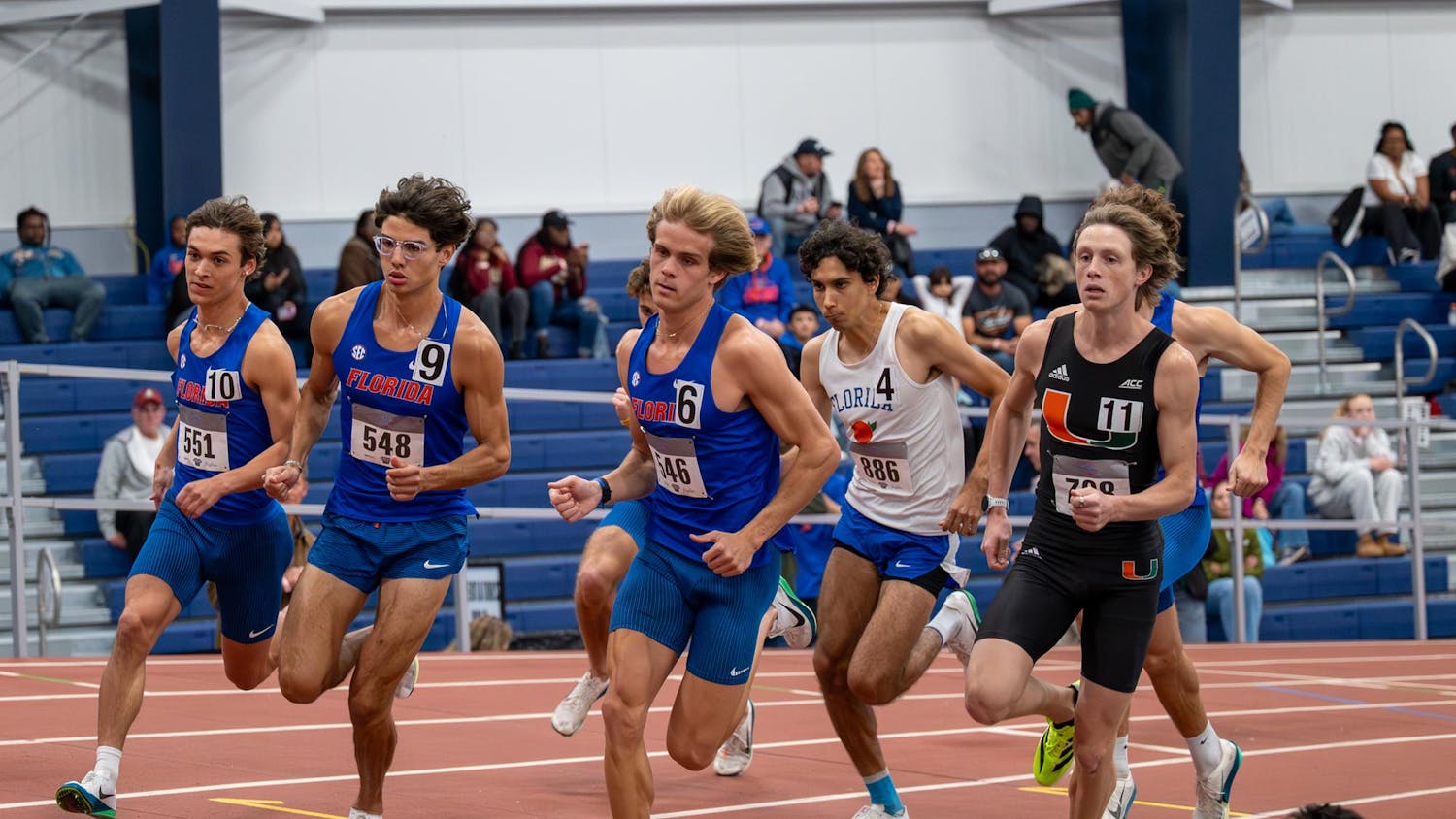The small forest behind Riker Hall is quiet. The wind rustles fallen leaves that cover the pipes running into the brush, which form makeshift paths toward secret smoke spots.
Pristine Thai makes her daily trek to the patio just across from the forest around 4 p.m. every afternoon to visit UF’s furriest residents. The sound of her steps on the gravel road signals her approach, usually with two or three tubes of Churu cat treats.
“Sometimes you’ll just see the black ones come out and they'll just sit on the trail and watch you,” she said. “It’s very disconcerting.”
A cracking of a twig: Two eyes peek over a log. Its body is camouflaged in the brown-green of the forest. But Thai and other experienced visitors recognize those eyes as belonging to one of the eight cats that call the space behind Riker their home.
The six tabbies and two black cats may have different names depending on who’s visiting that day. As somewhat-strays, each person interested enough to come close calls them differently.
Thai, a 19-year-old UF political science and public relations freshman, has been visiting the cats every day since December, when her roommate introduced them to her. They assigned names based on the cats’ widely varying personalities: Ellen, Eve, Diana, Frankie, Pluto, Duck, Goose and Mr. Big Balls.
“They have all this drama in their lives,” Thai said. “You guys are just cats. Why is there so much drama?”
Thai has tasked herself with socializing the cats, or acclimating them to human company. She likes the feeling of making them friendlier to people, she said.
“It goes from not really trusting you at all to being willing to come when it hears you,” she said. “There’s something very satisfying about that.”
The first eight weeks of a kitten’s life is the best time to begin socialization, according to Alley Cat Allies, a cat health advocacy group. After two months, it’s much more difficult to win over a kitten that has never interacted with humans.
Thai’s most recent concern has been with Pluto, one of the two kittens suspected to be children of Eve and Goose born in December. She last saw Pluto Feb. 12.
She worries for the worst: Being so young, Thai said, Pluto might have been unable to survive in the wild.
“Things happen to them, and you'll never know,” she said. “It's hard because you get emotionally attached to them the same way, but they have their lives outside of being your cat.”
Pluto’s willingness to hop on Thai’s lap only three weeks after they met made him her favorite, she said.
“I was like, ‘kitties!’ and then I just see Pluto pop up out of nowhere and immediately run toward me,” she said.
Stray cats on UF’s campus aren’t a new phenomenon. Tenders, the friendly outdoor cat that hangs by a picnic table in the Tolbert Area, has been a campus regular since 2018.
A UF environmental health and safety regulation prohibits groups and individuals from feeding feral cats and other wild animals out of concern for disease transmission and human injury. However, UF has yet to assert consequences for feeding, said Brad Files, UF pest management coordinator.
“Most people are practical about that,” he said. “The ones that aren’t put themselves in harm's way.”
Feeding wild animals on a regular basis can lead them to become reliant on human sources for food, Files said. He highly discourages students from feeding the animals, he said.
“People feed them thinking that they're friendly, but they're not really friendly,” he said. “They’re still wild animals out there."
Ellen, the cat who ran fastest to the food in Thai’s outstretched hand — and the chubbiest of the bunch — has a clipped ear, identifying she was spayed by Operation Catnip. The organization provides free spaying and neutering for stray cats.
“Ellen has a very big personality,” Thai said. “She's very vocal. One time I was petting her so much she started making biscuits.”
A cat “makes biscuits” by kneading the ground, mimicking a baker kneading dough. The behavior is common when cats feel comfortable, according to the American Animal Hospital Association.
Ella Cimino, an 18-year-old UF animal sciences freshman and Thai’s roommate, started feeding the cats in October, just after her childhood cat passed away, she said. To her, socializing feral cats is a give-and-take relationship, she said — she gives them food, they give her love and companionship.
“It's even more special because it’s not like you own them or they live with you,” she said. “Those cats are coming to you as an external source that they're slowly starting to trust. Forming that bond with something that is kind of feral, I think it's really important.”
After posting photos of the cats on social media, Cimino introduced them to Thai and two or three other friends, she said. But when they hear unfamiliar voices, the cats tend to be more skittish, she said.
Morgan Himes, a 20-year-old UF astrophysics and physics junior, has lived in the Keys Residential Complex for two years. She passes by the cats about three times a week on her path home from class, she said.
For nearly a year, Himes has visited the cats as a way to destress after a long day of classes.
“I just want to have some time to relax where I'm not thinking about doing my homework or when my next test is,” she said. “So, I just come in and hang out with the cats. It's stress relief.”
Although students and staff come and go, one thing stays the same: The Riker cats continue to be undeniable friends and companions of the campus community.
Contact Alissa at agary@alligator.org. Follow her on Twitter @AlissaGary1.

Alissa is the Fall 2025 editor-in-chief of The Alligator. She has previously been engagement managing editor and university editor, and she has covered stories across UF and Gainesville. She was also an intern at the Orlando Sentinel and The Chronicle of Higher Education. In her free time, she likes to spend time with her cat and take care of her plants.






